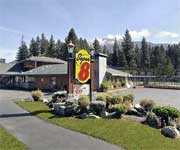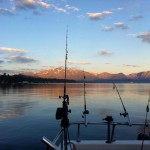"We want to make sure the trout we do plant don't have a negative impact," said Steve Martirano, a spokesman for Fish and Game.
"We are doing an assessment to determine which lakes will be stocked," said Martirano.
But the temporary halt of the high-altitude restocks leaves some avid fisherman fearing changes to their favorite back-country fishing hole and questioning the Fish and Game's sever and sudden cutoff of the service.
"Put some frogs in the airplanes and put them in an area that has no fish," said Jerome Yesavage, a governor of California Trout and a professor at Stanford University.
Yesavage recently published a fishing guide to the Desolation Wilderness and said its more than 100 stocked lakes make it a popular fishing area, and the decision could anger many fishermen.
"There's thousands of people that go fishing up there," said Yesavage.
Yesavage said the sudden halt to the stocking program was unexpected and will anger many fishing lovers.
"We've been trying to tell them to tone it down for years now," said Yesavage, who thinks the halt is extreme.
It is California Trout's policy to plant or not plant lakes based on what is best for a particular lake.
Others believe the halt will only make fishing in the back country better.
"As a fisherman, I think we can have our cake and eat it too," said Ralph Cutter, owner of the California School of Fly Fishing.
According to Cutter, much of the high-altitude lakes will return back to nature, whereas others have become self-sustaining, producing larger fish.
"They will continue to flourish," said Martirano.
Although the halt to stocking will reduce the number of fish, according to Cutter, the quality will increase.
"Many of the stocked lakes would have lots and lots of little fish that were stunted, actually starving to death because they were competing for food," said Cutter.
Not introducing the small fingerlings to the lakes will allow self-sustaining lakes to have healthier fish.
"But a lot of the area will return to the ways its supposed to be," said Cutter. The area historically did not have fish.
The introduction of trout to high-altitude lakes is definitely not a new practice. It can be traced to almost 140 years ago when trout were carried in jugs by horseback to the lakes.
But the innocent act of dumping fish in a remote lake may have disrupted the entire ecosystem, from the frogs to the bears that eat frogs.
"Bears can actually eat hundreds of pounds of frogs," said Cutter. "We're impacting a lot in a very bad way."
Fish and Game doesn't expect any immediate changes to the fishing.
"Even if we didn't stock at all this year, there wouldn't be a reduction in the fishable fish," said Martirano.
He added only small fingerlings are dropped from the air into the lakes and therefore take several years to mature before they can be fished.
"The frogs were there first," said Patrick Foy, Fish and Game information officer.
 Menu
Menu




